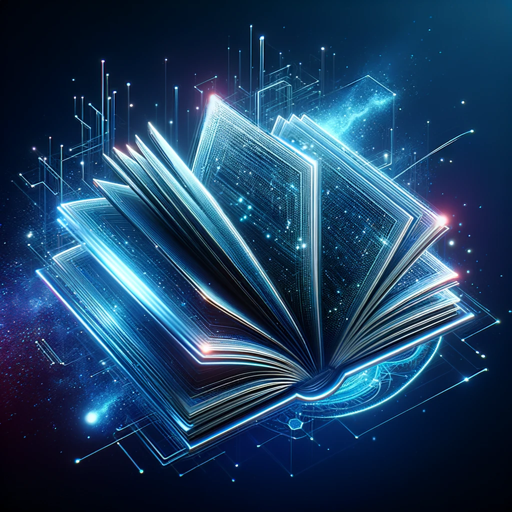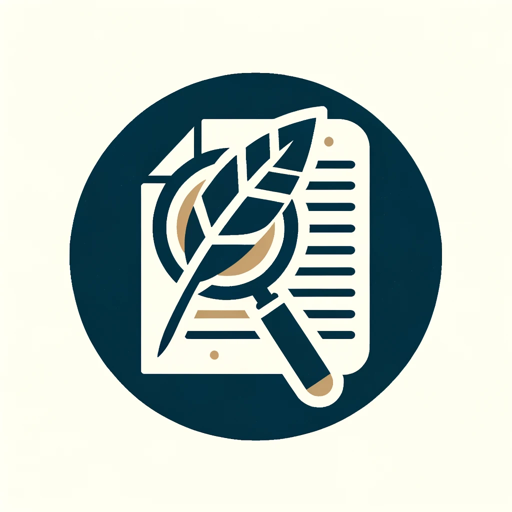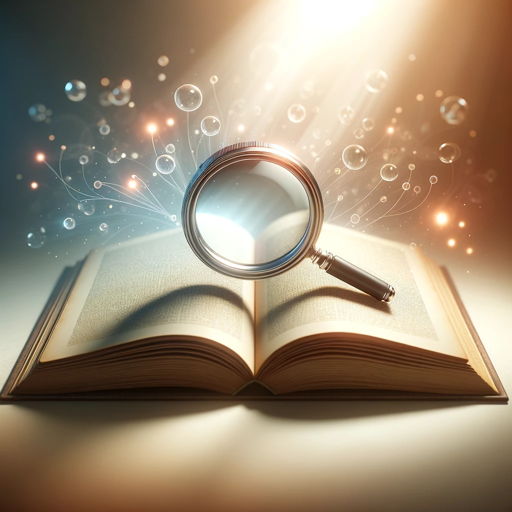Literature GPT-literary analysis tool
AI-powered literary insights and analysis
Explain the significance of '1984'.
Tell me about Virginia Woolf's life.
What are the key themes in 'The Catcher in the Rye'?
Discuss the impact of the Romantic movement.
Related Tools
Load More
Literature Review GPT
Engaging, friendly guide for academic literature reviews using research question or topic

Cite GPT
A GPT that generates and compiles citations into documents in styles like MLA, APA.

Correct English GPT
Write English like a native speaker. Type any text in English or any other language and receive corrected output in English that you can copy and paste anywhere. To improve the style of the corrected text, send "s"

Study Guide GPT
Experience a revolutionary approach to studying with Study Guide GPT. This AI-powered tool empowers learners of all levels to harness the full potential of their academic materials, effortlessly converting them into meticulously organized study guides tha

GPT Academic Paper (Experimental)
Writes an academic paper from a dataset

Research GPT
Your go-to source for well-researched information!
20.0 / 5 (200 votes)
Introduction to Literature GPT
Literature GPT is an advanced AI model designed to provide in-depth literary analyses, historical contexts, and thematic discussions of significant literary works. Created to serve students, educators, and literature enthusiasts, it aims to deepen understanding and appreciation of world literature. The model leverages a vast repository of literary knowledge and analytical tools to offer detailed insights into texts, authors, literary movements, and themes. For instance, when analyzing a novel like 'Moby Dick', Literature GPT can explore its narrative structure, symbolism, and the socio-historical context of 19th-century America, providing a comprehensive analysis that goes beyond mere summary.

Main Functions of Literature GPT
Literary Analysis
Example
Providing a detailed breakdown of themes, motifs, and character development in 'Pride and Prejudice'.
Scenario
A student preparing for an exam on English literature can use Literature GPT to understand the intricate details of the text, including character motivations and thematic elements, thus enriching their essay or presentation.
Historical Context
Example
Exploring the influence of the Industrial Revolution on the works of Charles Dickens.
Scenario
An educator designing a lesson plan on Victorian literature can leverage Literature GPT to provide students with a comprehensive overview of the period's social and economic conditions and their impact on literary production.
Thematic Discussions
Example
Analyzing the theme of existentialism in Albert Camus' 'The Stranger'.
Scenario
A literature enthusiast interested in existential philosophy can engage with Literature GPT to delve into how Camus' work reflects existential themes, enhancing their personal study and appreciation of the novel.
Ideal Users of Literature GPT
Students
Students at various levels of education can benefit from Literature GPT's detailed analyses and contextual information. It aids in their understanding of complex literary works, helps in preparing for exams, and assists in writing essays by providing comprehensive insights into texts.
Educators
Teachers and professors can use Literature GPT to enhance their lesson plans, gain deeper insights into literary works, and provide their students with enriched learning materials. Literature GPT's detailed analyses can serve as a valuable resource for creating engaging and informative lectures.
Literature Enthusiasts
Individuals with a passion for literature can explore the depths of various texts, authors, and literary movements using Literature GPT. It helps them to gain a more profound appreciation and understanding of literature, offering detailed discussions and analyses that go beyond surface-level interpretations.

How to Use Literature GPT
Step 1
Visit aichatonline.org for a free trial without login, also no need for ChatGPT Plus.
Step 2
Familiarize yourself with the interface and available features. Explore the different sections such as literary analysis, author biographies, and thematic discussions.
Step 3
Input your specific queries or topics of interest. Be as detailed as possible to receive comprehensive and relevant responses.
Step 4
Review the generated responses carefully. Utilize the in-depth analyses and historical contexts provided to enhance your understanding or academic work.
Step 5
Apply the insights and information obtained to your studies, teaching, or personal literary exploration. Engage with the content to deepen your literary knowledge.
Try other advanced and practical GPTs
Asterisk Guru
AI-powered Asterisk PBX Assistant

Dune GPT
AI-powered SQL optimization tool

Calc
AI-Powered Calculus Solutions

Vice Versa
AI-driven solutions for campaigns and strategy.

CS 2200 GPT
AI-powered assistance for CS 2200 Systems and Networks.

Usecase
AI-Powered System Visualization Tool

Fred Toys Creator
Bring Your Imagination to Life with AI-Powered Action Figures

Proteus
AI-powered assistance for every need.

Police Report-Writer Assistant
AI-powered tool for accurate police reports

Pro Code
Your Ultimate AI Coding Companion

Circuit Wizard
AI-Powered Digital Circuit Design

SSCI Q1 Guidence
AI-powered support for SSCI Q1 journal success.

- Academic Writing
- Literary Analysis
- Teaching Aid
- Theme Exploration
- Author Biographies
Common Questions about Literature GPT
What is Literature GPT?
Literature GPT is an AI-powered tool designed to provide in-depth literary analyses, author biographies, and discussions on literary movements and themes. It serves students, educators, and literature enthusiasts by offering comprehensive insights into significant works of literature.
How can Literature GPT assist in academic writing?
Literature GPT can help in academic writing by offering detailed analyses of literary texts, providing historical context, and discussing thematic elements. These insights can be used to support arguments, provide evidence, and enhance the depth of academic papers.
Can Literature GPT be used for teaching purposes?
Yes, Literature GPT is an excellent resource for educators. It provides thorough explanations and analyses that can be used to prepare lesson plans, engage students in discussions, and enhance the overall learning experience.
What kind of literary works does Literature GPT cover?
Literature GPT covers a wide range of literary works from various genres, periods, and cultures. It includes analyses of classic literature, contemporary works, and significant texts from different literary movements.
Is Literature GPT suitable for personal literary exploration?
Absolutely. Literature GPT is designed for anyone with an interest in literature. Whether you are a student, an educator, or simply a literature lover, it provides valuable insights and deep dives into texts that enhance personal understanding and appreciation of literature.